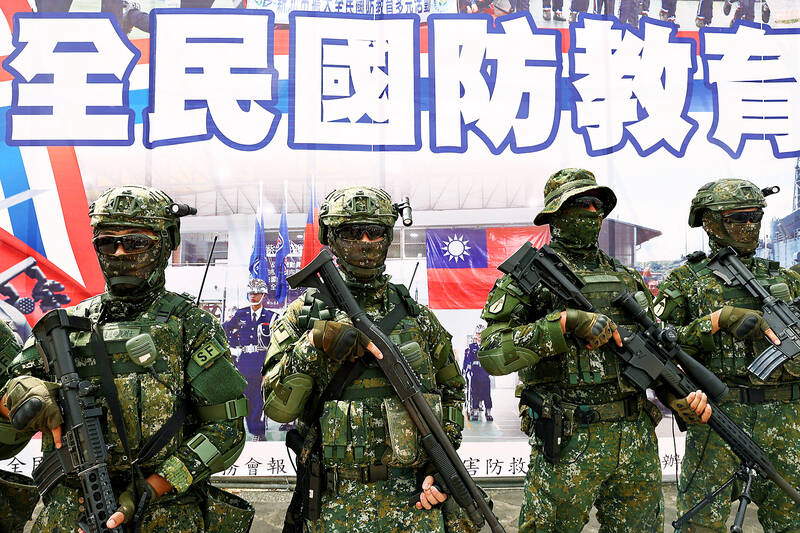The Ministry of National Defense (MND) is planning amendments to the General Mobilization Act (全民防衛動員準備法) to augment the nation’s mobilization preparedness.
In its draft amendments, the ministry is planning to include separate mobilization categories for the media, finance and information and communications sectors.
There would be preparation phases for workforce allotment, finance, transportation, health and sanitation, technology, and the military, the draft amendments say.

Photo: Ann Wang, Reuters
Regarding the information and communications sector, authorities would have a mandate to reorganize personnel working in publication, broadcasting, Internet platforms or other media service providers to handle the documentation and investigation of news and false information, the ministry said.
Preparations for the finance sector would include efforts to stabilize domestic finances and foreign-exchange rates, the draft amendments say.
The draft would include pre-mobilization preparations and actual mobilization, and the act’s name would be changed to the “available mobilization act.”
Mobilization preparations encompass peacetime preparations, while mobilization is defined as when the president orders a general or partial mobilization — in accordance with the Constitution — in the event that war breaks out, war is imminent or due to a disaster emergency.
Once the president declares mobilization, all readiness programs would transition to actual mobilization status, the draft amendments say.
The Executive Yuan would establish a reaction center to lead local government reaction centers. Local governments, if ordered to, would have priority access to all media and communications devices to report on the status of the war, emergency contingencies and other related information, the drafts says.
Once amended, the act would give the central government the power to allocate resources among all levels of government.
People caught driving up prices or hoarding goods without a legitimate reason would face a prison sentence of one to seven years and a fine of NT$5 million (US$164,042), the draft amendments say.
Individuals drafted by the government who fail to appear at the designated area at the appointed time would be sentenced to up to seven years in prison and have to pay a fine of NT$7 million.
Those disseminating false information on mobilization or drafting that could harm others during mobilization would face up to three years of prison and and a fine of NT$1 million.
The draft amendments say that those who disseminate false information via broadcast, electronic communications or the Internet could have their sentence doubled.

A magnitude 5.6 earthquake struck off the coast of Yilan County at 12:37pm today, with clear shaking felt across much of northern Taiwan. There were no immediate reports of damage. The epicenter of the quake was 16.9km east-southeast of Yilan County Hall offshore at a depth of 66.8km, Central Weather Administration (CWA) data showed. The maximum intensity registered at a 4 in Yilan County’s Nanao Township (南澳) on Taiwan’s seven-tier scale. Other parts of Yilan, as well as certain areas of Hualien County, Taipei, New Taipei City, Taoyuan, Hsinchu County, Taichung and Miaoli County, recorded intensities of 3. Residents of Yilan County and Taipei received

Taiwan has secured another breakthrough in fruit exports, with jujubes, dragon fruit and lychees approved for shipment to the EU, the Ministry of Agriculture said yesterday. The Animal and Plant Health Inspection Agency on Thursday received formal notification of the approval from the EU, the ministry said, adding that the decision was expected to expand Taiwanese fruit producers’ access to high-end European markets. Taiwan exported 126 tonnes of lychees last year, valued at US$1.48 million, with Japan accounting for 102 tonnes. Other export destinations included New Zealand, Hong Kong, the US and Australia, ministry data showed. Jujube exports totaled 103 tonnes, valued at

BIG SPENDERS: Foreign investors bought the most Taiwan equities since 2005, signaling confidence that an AI boom would continue to benefit chipmakers Taiwan Semiconductor Manufacturing Co’s (TSMC, 台積電) market capitalization swelled to US$2 trillion for the first time following a 4.25 percent rally in its American depositary receipts (ADR) overnight, putting the world’s biggest contract chipmaker sixth on the list of the world’s biggest companies by market capitalization, just behind Amazon.com Inc. The site CompaniesMarketcap.com ranked TSMC ahead of Saudi Aramco and Meta Platforms Inc. The Taiwanese company’s ADRs on Tuesday surged to US$385.75 on the New York Stock Exchange, as strong demand for artificial intelligence (AI) applications led to chip supply constraints and boost revenue growth to record-breaking levels. Each TSMC ADR represents

TRUST: The KMT said it respected the US’ timing and considerations, and hoped it would continue to honor its commitments to helping Taiwan bolster its defenses and deterrence US President Donald Trump is delaying a multibillion-dollar arms sale to Taiwan to ensure his visit to Beijing is successful, a New York Times report said. The weapons sales package has stalled in the US Department of State, the report said, citing US officials it did not identify. The White House has told agencies not to push forward ahead of Trump’s meeting with Chinese President Xi Jinping (習近平), it said. The two last month held a phone call to discuss trade and geopolitical flashpoints ahead of the summit. Xi raised the Taiwan issue and urged the US to handle arms sales to